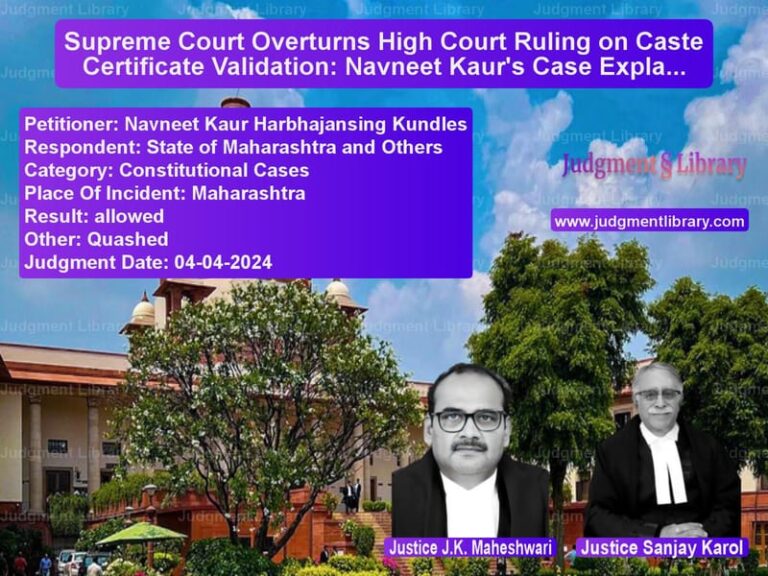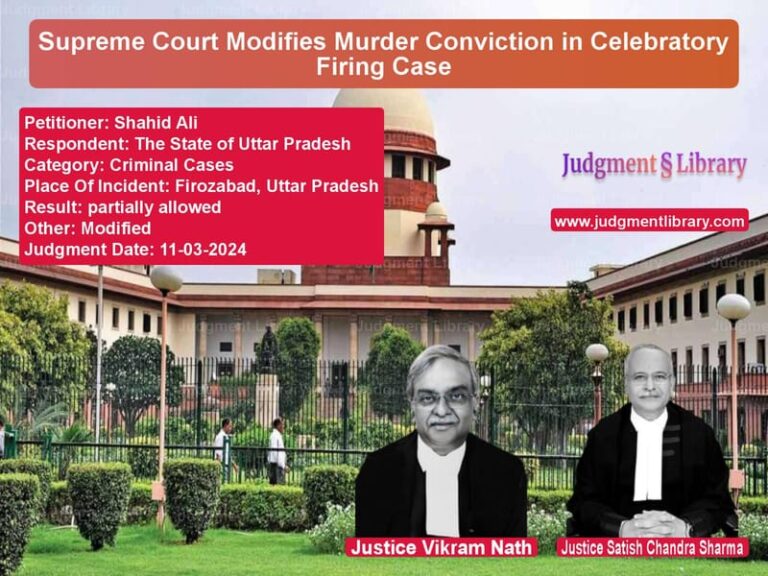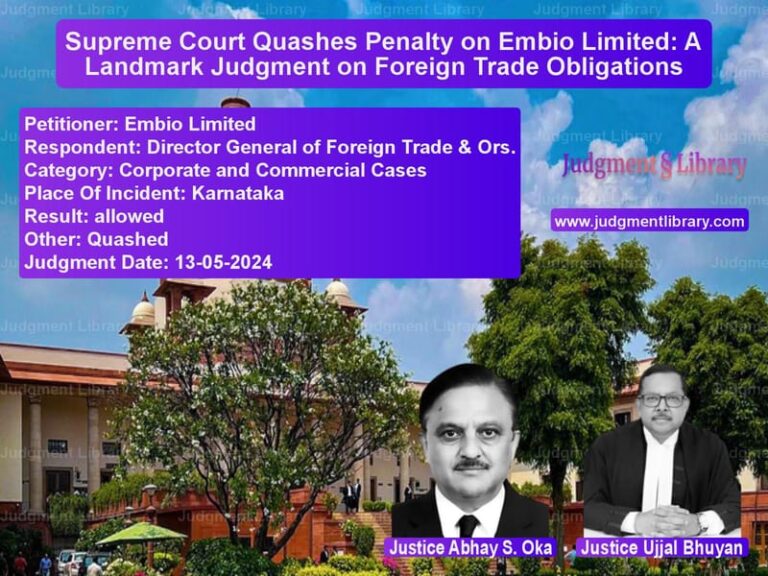Supreme Court Dismisses Review Petition in Abhinitam Upadhyay Case: Legal Finality Upheld
The case of Abhinitam Upadhyay vs. Hon’ble Allahabad High Court Through Its Registrar General is a crucial ruling by the Supreme Court, reaffirming the limited scope of review petitions under Indian law. The petitioner sought a review of the Court’s previous decision but failed to establish an ‘error apparent on record,’ leading to the dismissal of the review petition. This judgment serves as a significant precedent on the finality of Supreme Court decisions and the narrow grounds on which review petitions can be entertained.
The Supreme Court, in its order dated January 11, 2022, reiterated that a review petition is not a means for rehearing a case on merits but is restricted to cases where a clear and self-evident error exists in the judgment. The judgment strengthens the principle that courts should not allow litigants to relitigate matters already decided unless a compelling legal mistake is identified.
Background of the Case
The petitioner, Abhinitam Upadhyay, had originally approached the Supreme Court through a Special Leave Petition (SLP) challenging an order of the Allahabad High Court. However, on July 5, 2021, the Supreme Court dismissed the SLP, finding no merit in the arguments presented. The petitioner then filed a review petition, seeking reconsideration of the previous judgment.
Read also: https://judgmentlibrary.com/supreme-court-remands-caste-certificate-case-for-fresh-review/
The review petition sought an oral hearing and claimed that the Court had overlooked crucial legal issues in its earlier decision. However, the Supreme Court, after examining the submissions, found that no ‘error apparent on record’ was present and thus rejected the plea.
Legal Issues Raised
The primary legal issues before the Supreme Court in the review petition were:
- Whether the petitioner had demonstrated an ‘error apparent on record’ in the Court’s previous decision.
- Whether the review petition was being used as a disguised appeal, which is not permitted under Indian law.
- Whether an oral hearing was necessary for deciding the review petition.
Arguments of the Petitioner
The petitioner, through legal counsel, presented the following arguments:
- Error Apparent on Record: The petitioner contended that the Supreme Court’s previous order contained errors that warranted correction under review jurisdiction.
- Misinterpretation of Law: It was argued that certain legal provisions relevant to the case were either misinterpreted or overlooked.
- Oral Hearing Request: The petitioner sought an oral hearing to further elaborate on the grounds for review.
- Judicial Oversight: The petitioner submitted that the previous judgment did not fully consider the arguments and precedents presented.
Arguments of the Respondent
The Allahabad High Court, represented through its Registrar General, opposed the review petition and raised the following counterarguments:
- Finality of Judgment: The respondent argued that a review petition cannot be treated as an appeal or a second opportunity to argue the case.
- No Apparent Error: The previous decision was legally sound, and the petitioner had failed to demonstrate any self-evident mistake.
- Oral Hearing Not Mandatory: Since review petitions are usually decided on record, an oral hearing was unnecessary.
- Judicial Economy: Entertaining review petitions without substantial errors would create an undue burden on the judiciary and undermine the finality of judgments.
Supreme Court’s Observations
The Supreme Court, led by Justices Uday Umesh Lalit and Ajay Rastogi, examined the grounds raised in the review petition and made the following key observations:
- Strict Limits of Review Jurisdiction: The Court reiterated that review petitions are restricted to cases where a clear and self-evident error exists, which was not demonstrated in this case.
- No Fresh Arguments Allowed: The Court held that the petitioner was merely rearguing the case, which is impermissible under review jurisdiction.
- Finality of Supreme Court Decisions: It was emphasized that once a decision has been rendered, it should not be reopened except in cases of manifest injustice.
- No Need for Oral Hearing: The Court found that there was no necessity for an oral hearing, as the case did not meet the threshold for review.
Final Judgment
The Supreme Court dismissed the review petition, stating:
“The submissions advanced on behalf of the petitioners were dealt with in the order dated 05.07.2021 against which the instant review petition is preferred. The grounds raised in the review petition do not make out any error apparent on record to justify interference.”
Legal Precedents and Implications
This ruling aligns with established legal precedents governing review petitions. The Supreme Court has consistently held that:
- A review petition must be based on an error apparent on the face of the record, not on arguments already considered and rejected.
- Review jurisdiction is not an opportunity for rehearing or relitigating a case.
- Finality of judgments is essential for judicial stability, and frequent reviews undermine this principle.
- Oral hearings in review petitions are not mandatory unless exceptional circumstances exist.
This decision further reinforces the Court’s stance that review petitions should not be used to challenge the correctness of a judgment unless there is a glaring mistake. The ruling provides guidance on judicial efficiency and the necessity of adhering to procedural limitations in review matters.
Conclusion
The Supreme Court’s dismissal of the review petition in Abhinitam Upadhyay vs. Hon’ble Allahabad High Court Through Its Registrar General reaffirms the doctrine of legal finality. By strictly applying the principles governing review jurisdiction, the Court ensures that its resources are not expended on cases where no substantial error exists. The ruling serves as a caution to litigants who attempt to use review petitions as a backdoor method to reopen closed matters. It upholds the integrity of judicial decisions and maintains the balance between judicial review and finality.
Petitioner Name: Abhinitam Upadhyay.Respondent Name: Hon’ble Allahabad High Court Through Its Registrar General.Judgment By: Justice Uday Umesh Lalit, Justice Ajay Rastogi.Place Of Incident: Allahabad High Court.Judgment Date: 11-01-2022.
Don’t miss out on the full details! Download the complete judgment in PDF format below and gain valuable insights instantly!
Download Judgment: abhinitam-upadhyay-vs-hon’ble-allahabad-hi-supreme-court-of-india-judgment-dated-11-01-2022.pdf
Directly Download Judgment: Directly download this Judgment
See all petitions in Fundamental Rights
See all petitions in Public Interest Litigation
See all petitions in Constitution Interpretation
See all petitions in Judgment by Uday Umesh Lalit
See all petitions in Judgment by Ajay Rastogi
See all petitions in dismissed
See all petitions in supreme court of India judgments January 2022
See all petitions in 2022 judgments
See all posts in Constitutional Cases Category
See all allowed petitions in Constitutional Cases Category
See all Dismissed petitions in Constitutional Cases Category
See all partially allowed petitions in Constitutional Cases Category







